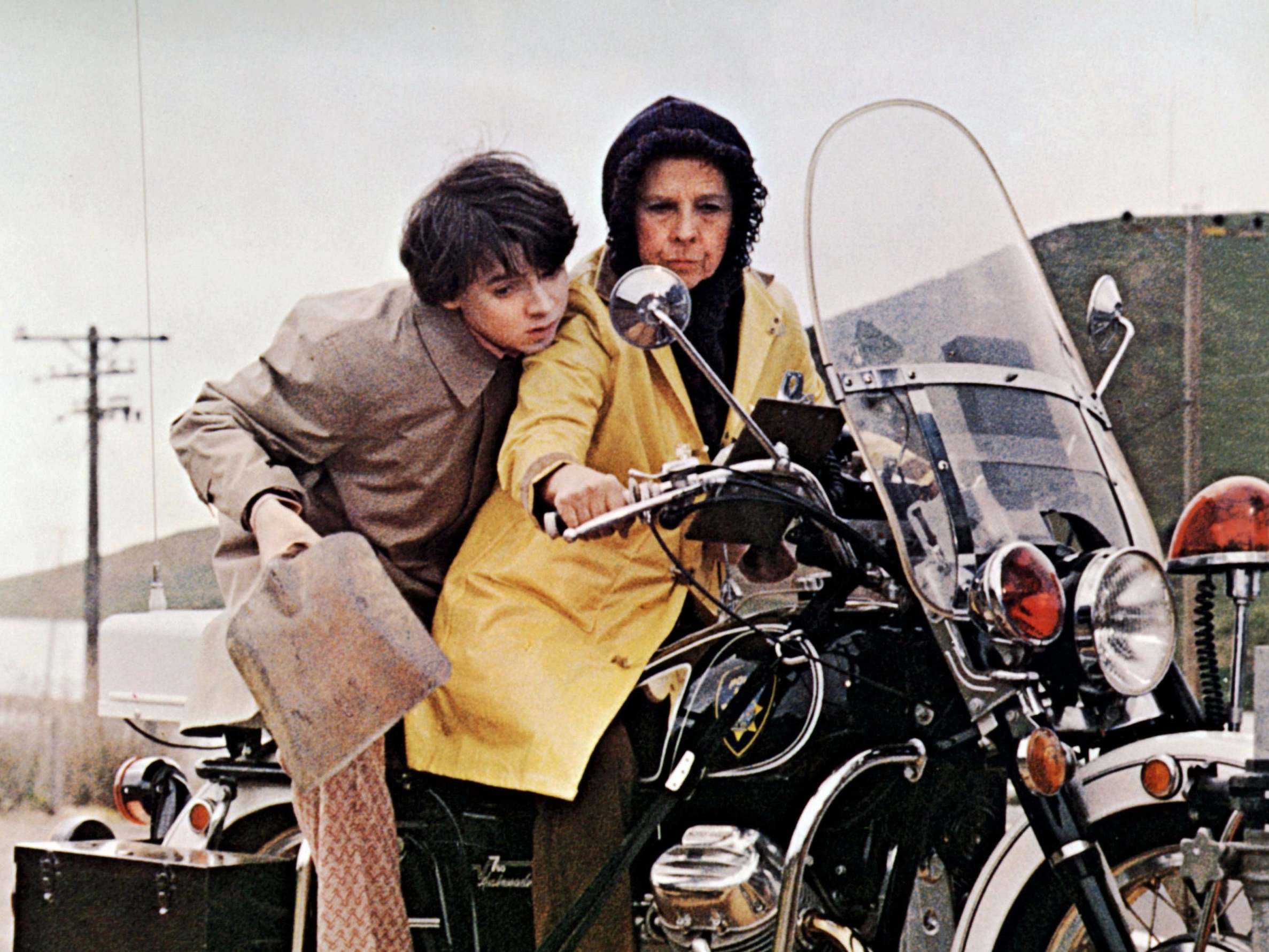The Indy Film Club: Unlikely romcom ‘Harold and Maude’ is a reminder to live life to the full
We’ve launched a weekly film social where you get to vote what we watch and then pitch in with your reviews. Our chief film critic Clarisse Loughrey kicks things off with a seventies cult flick that feels particularly timely


Your support helps us to tell the story
From reproductive rights to climate change to Big Tech, The Independent is on the ground when the story is developing. Whether it's investigating the financials of Elon Musk's pro-Trump PAC or producing our latest documentary, 'The A Word', which shines a light on the American women fighting for reproductive rights, we know how important it is to parse out the facts from the messaging.
At such a critical moment in US history, we need reporters on the ground. Your donation allows us to keep sending journalists to speak to both sides of the story.
The Independent is trusted by Americans across the entire political spectrum. And unlike many other quality news outlets, we choose not to lock Americans out of our reporting and analysis with paywalls. We believe quality journalism should be available to everyone, paid for by those who can afford it.
Your support makes all the difference.It’s hard to mourn for the smaller things these days. At a time of such devastation and loss, when so many people’s lives have been turned upside down, it seems a little flippant to miss the soothing glow of the silver screen. But I do. And I know that there are many others who feel the same way. Cinema is at its finest when it’s a collective experience – it’s the gasp or cheer that suddenly rings out in the dark, or the way an entire room will hold its breath at the exact same time.
Granted, it’s challenging to replicate that when we’re all locked away in our respective homes, but we can at least try. That’s why we’ve decided to set up The Independent Film Club: a space where we can talk, find joy, and share a mutual love of cinema. Each Monday, one of the team will pick a selection of four cult films that you can then vote between on The Indy Film Twitter account. The winning choice will be announced the following day, giving you the rest of the week to sit down and watch it. On the Sunday, a short essay on the film will be published on the site, inviting you to share your own thoughts both in the comments and on social media.
We hope to shine a light on some of the best cult films and hidden gems from across the decades. In that light, my first four picks were Neil Jordan’s horror-fantasy The Company of Wolves, Hideo Nakata’s Japanese-horror Ring, Vera Chytilova’s delightfully free-spirited Daisies, and Hal Ashby’s Harold and Maude. Although it was a close race, the last of these eventually won with 32.2 per cent of the vote.
Back in 2017, Chicago Tribune critic Mark Caro wrote: “I’m sorry, Harold and Maude, for denying you for so long. You’re my favourite movie once again.” It’s not often that a critic will pen an apology letter. But Harold and Maude is exactly the kind of film that necessitates one. Released in 1971, it spoke with the muzzled voice of the anti-establishment – eager to question social mores and champion ideas of free love.
Directed by the free-spirited Ashby, the film revolves around Harold Chasen (Bud Cort), a young man with an all-consuming fascination with death. He stages gruesome fake suicides in order to rile up his aristocratic mother (Vivian Pickles), attends the funerals of strangers, and drives a hearse. He’s sent off to psychiatrists, priests, and the military – nothing will quell his morbidity. That is, until he meets Maude (Ruth Gordon), a 79-year-old woman determined to treat life as one great adventure. The two become friends, then lovers. Maude shows him the joys of life well-lived. In response, his complexion transforms from deathly pale to rosy. It’s like watching him rise from the grave.
The film, released by Paramount Pictures, bombed at the box office and was ravaged by critics. Variety declared that it had “all the fun and gaiety of a burning orphanage”. Few were sold on the film’s dark humour. Even fewer embraced the May to December romance. Ashby had originally wanted to include a (tasteful) love scene, but it was cut on the demand of Love Story star Ali MacGraw, then-wife to studio boss Robert Evans. Even then, Harold and Maude was still brushed off as the film about a 20-year-old shacking up with a pensioner.
The film took nearly a decade to find its audience. It was college students who slowly became infatuated with Harold and Maude’s heady idealism, as it started to screen in repertory theatres and on campuses across the US. The film’s screenwriter Colin Higgins, in fact, first wrote Harold and Maude as part of his master’s thesis. Filmmakers like Wes Anderson and Cameron Crowe found themselves inspired by Ashby’s whimsy and verve.
It was some time before the controversy died down and the right people saw the film for what it was. In truth, the sexual nature of Harold and Maude’s relationship isn’t all that important. Their love isn’t based primarily on desire, but on the near-harmonious balance of their spirits. They rescue each other from uncertainty. Maude gives Harold the gift of life, while Harold helps Maude comes to terms with death. There’s a sense they understand each other intuitively. We don’t actually learn much about these characters’ lives: a quick glimpse of a tattoo reveals that Maude spent time in a concentration camp, while Harold shares a story about his time in boarding school when a chemistry lab explosion led police to think he was dead. His mother reacted with a highly theatrical fainting spell. “I decided then I enjoyed being dead,” Harold says, with tears in his eyes.
Cort plays Harold as a sullen anarchist, adding a mischievous wink to his sickly, Victorian countenance. The delightful moment where he looks directly into the camera, following another of his ghoulish tricks, was improvised on the day. Gordon, who had already won an Oscar for her satanic role in Rosemary’s Baby, is equally breezy and playful when it comes to Maude’s disdain for authority figures. Take the scene where she toys with a traffic cop (a young Tom Skerritt) and eventually steals his motorcycle.

Watch Apple TV+ free for 7 days
New subscribers only. £8.99/mo. after free trial. Plan auto-renews until cancelled

Watch Apple TV+ free for 7 days
New subscribers only. £8.99/mo. after free trial. Plan auto-renews until cancelled
Harold and Maude became the prototypes for a certain type of self-consciously styled weirdo. It’s easy, certainly, to see what Wes Anderson picked up from Ashby’s work. There’s the aggressive symmetry, the Cat Stevens soundtrack, and the erratic editing style of the French New Wave. Harold’s stylish mother reacts impassively to all of Harold’s staged suicides – when she finds him hanging from a chandelier, she responds with: “Now, Harold, I suppose you think that’s funny.” She could easily be one of the Tenenbaums. The Anderson connection has only helped cement Harold and Maude’s reputation. It’s a message in a bottle from the hippie generation – reminding us all about what it means to grab life by the horns.
Join our commenting forum
Join thought-provoking conversations, follow other Independent readers and see their replies
Comments